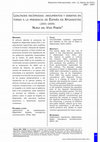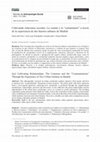Transiciones. Huertos urbanos comunitarios by Nuria Del Viso Pabón
In needed times of transition, a cultural change is key to re-direct the way. This text, included... more In needed times of transition, a cultural change is key to re-direct the way. This text, included in the book "La gran encrucijada" reviews the economic and cultural myths present in Western societies and which lead us to the current socio-ecological crisis, and makes proposals to foster a radical cultural change which respects nature and peoples' limits.
This ethnographic research on urban community gardens analyses what means and how it expresses th... more This ethnographic research on urban community gardens analyses what means and how it expresses the “communitarian” dimension of these projects. The article deals with these questions from a socio-spatial approach, exploring how community is produced through the organizational mechanisms, relationships, practices and discourses. It also addresses the group relationships and the appropriation of the urban space, producing a place as a means to create community. The resulting community group presents some distinctive traits, such as the revaluation of the category of proximity with a simultaneous development of translocal links, or the diversi cation of the forms of participating, which includes in-person and virtual formats. The text is a double case study and a comparison exercise in two urban community gardens in Madrid.
What if, rather than the barricade, we were to think of counter-power in terms of a space such as... more What if, rather than the barricade, we were to think of counter-power in terms of a space such as a community garden? This text, published in the report State of Power 2018 (TNI), examines the transformative and prefigurative capacities of urban community gardens as expressions of counter-power and analyses the case of the movement of urban argriculture in Madrid, Spain.
Nos interesa el contrapoder en la medida en que hace referencia a habitar un conflicto sin estar ... more Nos interesa el contrapoder en la medida en que hace referencia a habitar un conflicto sin estar obsesionado por la confrontación, en la medida en que reconoce un gesto de desafío radical en la construcción de nuevas relaciones sociales Agroecología, autogestión y articulación social constituyen los tres rasgos que definen el trabajo de los huertos comunitarios a escala local, donde se cultivan alimentos y cosechan relaciones sociales Síguenos: Boletines FOCOS MENÚ José Luis Fdez. Casadevante "Kois" (/autores/jose_luis_fdez-_casadevante_-kois/) / Nerea El dinero de todos Casado Racismo Medio ambiente Frontera ¿Por qué y para qué utilizamos cookies?
Conflictos socioecológicos by Nuria Del Viso Pabón
This paper, final chapter of the book "La situación del mundo 2015", reflects on the socio-ecolog... more This paper, final chapter of the book "La situación del mundo 2015", reflects on the socio-ecological conflicts, their relations with extractivism --analysising the cases of mining, land grabbing and fracking-- and the serious impacts on democracy and proposes some broad guidelines for the resolution of this type of conflicts.
Unless we are able to reverse the current trends in extractivism and socio-environmental conflic... more Unless we are able to reverse the current trends in extractivism and socio-environmental conflicts, no mediator will be capable to stop the serious consequences of this type of conflicts.
Si no se revierten las actuales tendencias no habrá mediador capaz de frenar o resolver los conflictos socioecológicos y sus graves impactos porque son luchas por asegurar unas mínimas condiciones de vida (del ecosistema y de las sociedades), algo que está cada vez más en disputa en el capitalismo del desastre.
La movilización social surge como la única forma de poner freno al acaparamiento de tierras. En a... more La movilización social surge como la única forma de poner freno al acaparamiento de tierras. En algunas ocasiones, ha conseguido mitigar los efectos nocivos de las operaciones realizadas; en otros, incluso, revertirlas y paralizar los planes en marcha.
Cambio climático by Nuria Del Viso Pabón
The article contextualizes climate change in the framework of its deep roots, related to distinct... more The article contextualizes climate change in the framework of its deep roots, related to distinctive features of present, contemporary capitalism, one of which is the expulsion of people from their original habitats. Such dynamics combined with an excessive extractivism of energy and materials result in habitat destruction and forced displacement. The text focuses on the characteristics and manifestations of forced displacement due to environmental and climatic causes, paying attention at mobility patterns under the light of recent findings and research. It also analyses the expected impacts of global warming, including it's effects on food and it's implications on human rights, and examines the main features of international, regional and national debates and politics on forced displacement.
La mercantilización de recursos básicos en la era del cambio climático Afrontamos el riesgo de qu... more La mercantilización de recursos básicos en la era del cambio climático Afrontamos el riesgo de que la planificación para la nueva época de calentamiento global quede al arbitrio de corporaciones o de gobiernos, a menudo más preocupados en alianzas y equilibrios diplomáticos
Estados, instituciones de seguridad y corporaciones han logrado apropiarse del debate del cambio ... more Estados, instituciones de seguridad y corporaciones han logrado apropiarse del debate del cambio climático, que ha quedado restringido a los estrechos márgenes de la seguridad nacional en el sentido más clásico, mientras se ignoran las causas, responsabilidades diferenciadas e impactos desiguales. El calentamiento global se presenta como peligro y "multiplicador de amenazas" que nos aboca a un mundo convulso. Las respuestas se reducen a la securitización a través de una "gestión de crisis" cortoplacista, una adaptación y resiliencia asentadas en supuestos injustos, la mercantilización de la crisis climática y de un tecnoptimismo ilimitado. En definitiva, se profundizan las brechas que separan a los privilegiados de los desposeídos.
Transnacionales de distintos sectores buscan hacer del cambio climático una gran oportunidad de l... more Transnacionales de distintos sectores buscan hacer del cambio climático una gran oportunidad de lucro, desde las petroleras a las compañías de seguros, pasando por el complejo de la seguridad, que lo mismo suministra concertinas para blindar las fronteras que personal o sistemas de vigilancia. EFE El dinero de todos Casado Racismo Medio ambiente Frontera
Seguridad internacional. Afganistán by Nuria Del Viso Pabón

The article deals with the role of Spain in the international operation in Afghanistan from 2001,... more The article deals with the role of Spain in the international operation in Afghanistan from 2001, and the reasons to justify or criticize the mission. After reviewing the general context of the operation, the text analyses the positions of the three governments responsible for the mission. The discreet, modest presence of Spain in Afghanistan until 2008 didn’t prevented a cautious but continuous rise of its implication. From 2009 -the author argues-, in coincidence with Obama’s victory, there is a change of trend in the Spanish role towards the mission, with a more enthusiastic support.
The article also examines the evolution in the positions towards the operation both of the Spanish Parliamentary groups and the public opinion. The text concludes arguing that in a phase of increased Spanish commitments and aswering the request of support that the Spanish Government is asking to the citizenship, a process of re exion and public debate -absent up to now- should be undertaken; it will allow to clarify positions and, ideally, to reach common agreements for future action.
Papers by Nuria Del Viso Pabón
Papeles de relaciones ecosociales y cambio global, 2021

Revista de Antropología Social
Esta investigación etnográfica se centra en los huertos urbanos comunitarios con el objetivo de e... more Esta investigación etnográfica se centra en los huertos urbanos comunitarios con el objetivo de examinar en qué consiste su dimensión comunitaria y analizar de qué maneras se expresa. Para ello, el artículo aborda estas cuestiones desde un punto de vista socioespacial explorando las formas de producción de comunidad a través de la organización, relaciones, prácticas y discursos de los participantes. Se aborda la relación y apropiación del espacio urbano, produciendo lugar como un modo de construir comunidad. La comunidad resultante presenta algunos rasgos particulares, como la revalorización de la categoría de proximidad al tiempo que se desarrollan los lazos translocales, o la diversificación de formas de participación, que incluye formatos tanto presenciales como virtuales. El texto es un doble caso de estudio y comparación en dos huertos urbanos comunitarios de Madrid.
Durante las últimas décadas, las sociedades humanas están agotando los recursos a un ritmo insost... more Durante las últimas décadas, las sociedades humanas están agotando los recursos a un ritmo insostenible. Los conflictos socioecológicos remiten a una doble problemática ecológica y social derivada tanto del extractivismo en sus diferentes expresiones --extracción de bienes naturales; plantaciones agroindustriales de cultivos para la exportación; acaparamiento de tierras; o introducción de nuevas tecnologías extractivas como el fracking, entre otras-- como a la degradación ecológica y a la saturación de los sumideros del planeta. Todo ello conlleva impactos ecológicos y sociales que generan fuertes resistencias en las poblaciones afectadas. Estos conflictos dejan entrever la necesidad urgente de un compromiso con unas economías sostenibles en las que los recursos se custodien de forma democrática y el medio ambiente esté protegido para garantizar la supervivencia humana.
The article contextualizes climate change in the framework of its deep roots, related to distinct... more The article contextualizes climate change in the framework of its deep roots, related to distinctive features of present, contemporary capitalism, one of which is the expulsion of people from their original habitats. Such dynamics combined with an excessive extractivism of energy and materials result in habitat destruction and forced displacement. The text focuses on the characteristics and manifestations of forced displacement due to environmental and climatic causes, paying attention at mobility patterns under the light of recent findings and research. It also analyses the expected impacts of global warming, including it's effects on food and it's implications on human rights, and examines the main features of international, regional and national debates and politics on forced displacement.

Relaciones Internacionales, 2010
El articulo aborda la presencia de Espana en Afganistan desde 2001 y los argumentos esgrimidos pa... more El articulo aborda la presencia de Espana en Afganistan desde 2001 y los argumentos esgrimidos para justificar o criticar la mision. Despues de repasar el entorno general, el texto analiza las posiciones durante tres legislaturas de los gobiernos espanoles responsables de la mision. El perfil discreto de Espana hasta 2008 no ha impedido un continuado aunque cauteloso aumento de su implicacion. En 2009, con la victoria de Obama, se aprecia un cambio de tendencia y un apoyo mas entusiasta a la operacion. Igualmente, se analiza la evolucion de las posiciones de los grupos parlamentarios y las tendencias en la opinion publica. El articulo concluye que, en una etapa de mayores compromisos, y en respuesta al respaldo a la mision que el gobierno pide a los ciudadanos, debe realizarse un proceso de reflexion y debate publico sobre el papel de Espana en Afganistan; ello permitira clarificar posiciones e idealmente alcanzar consensos. The article deals with the role of Spain in the international operation in Afghanistan from 2001, and the reasons to justify or criticize the mission. After reviewing the general context of the operation, the text analyses the positions of the three governments responsible for the mission. The discreet, modest presence of Spain in Afghanistan until 2008 didn’t prevented a cautious but continuous rise of its implication. From 2009 -the author argues-, in coincidence with Obama’s victory, there is a change of trend in the Spanish role towards the mission, with a more enthusiastic support. The article also examines the evolution in the positions towards the operation both of the Spanish Parliamentary groups and the public opinion. The text concludes arguing that in a phase of increased Spanish commitments and aswering the request of support that the Spanish Government is asking to the citizenship, a process of reflexion and public debate -absent up to now- should be undertaken; it will allow to clarify positions and, ideally, to reach common agreements for future action.











Uploads
Transiciones. Huertos urbanos comunitarios by Nuria Del Viso Pabón
Conflictos socioecológicos by Nuria Del Viso Pabón
Si no se revierten las actuales tendencias no habrá mediador capaz de frenar o resolver los conflictos socioecológicos y sus graves impactos porque son luchas por asegurar unas mínimas condiciones de vida (del ecosistema y de las sociedades), algo que está cada vez más en disputa en el capitalismo del desastre.
Cambio climático by Nuria Del Viso Pabón
Seguridad internacional. Afganistán by Nuria Del Viso Pabón
The article also examines the evolution in the positions towards the operation both of the Spanish Parliamentary groups and the public opinion. The text concludes arguing that in a phase of increased Spanish commitments and aswering the request of support that the Spanish Government is asking to the citizenship, a process of re exion and public debate -absent up to now- should be undertaken; it will allow to clarify positions and, ideally, to reach common agreements for future action.
Papers by Nuria Del Viso Pabón
Si no se revierten las actuales tendencias no habrá mediador capaz de frenar o resolver los conflictos socioecológicos y sus graves impactos porque son luchas por asegurar unas mínimas condiciones de vida (del ecosistema y de las sociedades), algo que está cada vez más en disputa en el capitalismo del desastre.
The article also examines the evolution in the positions towards the operation both of the Spanish Parliamentary groups and the public opinion. The text concludes arguing that in a phase of increased Spanish commitments and aswering the request of support that the Spanish Government is asking to the citizenship, a process of re exion and public debate -absent up to now- should be undertaken; it will allow to clarify positions and, ideally, to reach common agreements for future action.